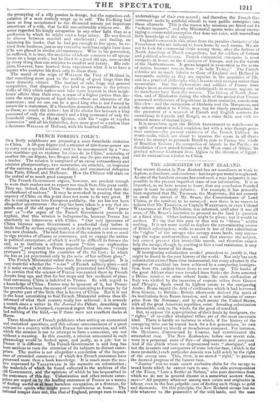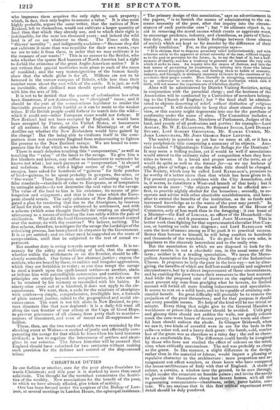THE ABORIGINES OF NEW ZEALAND.
THE recent disaster in New Zealand has set moralizers at work to deplore, animadvert, and condemn : but its proper moral is neglected. As one of the harshest censors has confessed, a true judgmeht is im- possible in the present imperfect state of our information. It is so imperfect, as we have reason to know, that any conclusion founded upon it must be utterly delusive. For example, it has generally been regretted that Mr. Tienaisces, the Magistrate, did not consent
to await the arrival of Mr. SPAIN, the Commissioner of Land Claims, at the territory to be surveyed : now there is no reason to to await the arrival of Mr. SPAIN, the Commissioner of Land Claims, at the territory to be surveyed : now there is no reason to believe that Mr. THOMSON, or Captain WAKEFIELD, or even Colonel WAKEFIELD at Port Nicholson, was informed, until after it was all over, of Mr. SPAIN'S intention to proceed to the land in question at a fixed time. Other instances might be given ; but it would be useless. To say that this part or that was to " blame " settles nothing. It is not more useful to deplore the exterminating course of British colonization; while to assert in bar of that colonization the " rights " of the savages who occupy waste lands, may encou- rage the vague sentimentalism and cant that obscure the subject, but cannot prevent that irresistible march, and therefore cannot help the savage, though, by exciting in him a mad resistance, it may aggravate the terror of his doom.
If immigrating colonization needed precedent to justify it, that might be found in the past history of the world. Not only has such colonization existed from time immemorial, but every advance in the progress of mankind has been achieved by a conquering immigra- tion, from the earliest times down to our own age. The banks of the great African river were invaded from Syria ; the Jews asserted a Divine mission to seize others' lands; the rude civilization of Italy was vivified by the incursion of cognate tribes from Greece and Phrygia ; Spain owed its highest estate to the conquering Arabs; Rome repaid the debt of civilization which it had borrowed from Greece, to Britain; Britain afterwards derived the spirit of its institutions from Saxon invasion, and a new infusion of enter- prise from the Normans ; and by such means the United States, with all the great American republics, exist. Invading colonization is irresistible, and, on the whole, for the good of mankind.
But, to oppose the appropriation of their lands by foreigners, the "
rights" of so-called aboriginal tribes are of the most uncertain kind. There is hardly an instance in which, if the history of the occupying tribe can be traced back for a few generations, its own title is not based on bloody or treacherous conquest. For instance, the Mexicans, dispossessed by CORTES, had exterminated the antecedent race. The New Zealanders, before our recent rule, were in a perpetual state of flux—of dispossession and conquest. And if the chiefs whom we dispossessed were "aboriginal," and not the invaders and conquerors of some inferior race, (which is far more probable,) each particular domain was held solely by the right of the strong arm. This, then, is no sacred " right," to gainsay the decreed progress of the human race. " Justice " can no more assert exclusive claim for the savage to broad lands which he cannot turn to use. An able correspondent of the Times, "Late a Settler at Nelson," who puts doctrines from which we do not in general dissent in a somewhat austere form, says—" All property whatever among men exists and originates in labour, even in the less palpable case of finding such things as gold and diamonds. On this principle, the New Zealand savage has no title whatever, to the possession of the wild lands, and the man who improves them acquires the only right to such property ; which, in fact, then only begins to assume a value." It is also most highly probable, argues the same writer, that the natives of New Zealand, left to themselves, would not cultivate a larger quantity of land than that which they already use, and to which their right is indefeasible, for the next ten thousand years ; and indeed the wild land is of no use whatever to them. The Times calls this "thieves' morality "; and indignantly exclaims—" Because they did not cultivate it more than was requisite for their own wants, ergo we are to take it from them, in order that we may cultivate it to the measure of our wants ! " This is no answer to the Settler, who asks whether the sparse Red hunters of North America had a right to forbid the existence of the great Anglo-American nation ? It is not written that special territories were given to each of the races of mankind ; and the very transmigrations of the human family show that the whole globe is for all. Millions are not to be hemmed in the narrow compass of Britain, while less than their number roam about the vast wilds of the earth. It is just, as well as inevitable, that civilized man should spread abroad, carrying with him the arts of life.
It is not to be denied that the course of colonization has often been disastrous, if not destructive, to " aboriginal" races; and it should be the part of the conscientious legislator to render the inevitable process as little hurtful as it can be made to the weaker tribes. If the British people could forbear its march into the wild— which it could not—other European races would not forbear. If New Zealand had not been occupied by England, it would have been occupied by France, or the United States, or buccaneers of all nations : let the aborigines of the Mississippi or of the Antilles say whether the New Zealanders would have gained by the change ! But the being able to vindicate itself in the com- parison does not exonerate England from endeavouring to lighten the process to the New Zealand savage. We are bound to com- pensate him for that which we take from him. There is much delusion touching this "compensation," as well as touching the " value " of the lands to the savage. To give him a few blankets and knives, may suffice as inducement to surrender he knows not what ; but such payment as "compensation "is absurd and nefarious. Some, with a higher notion of the " rights " of savages, have asked for hundreds of "guineas" for little patches of land—guineas, to be spent probably in gewgaws, fire-arms, or "fire-water." These European methods of estimating values by false standards—standards of value to Europeans, or of temptation to untaught minds—do not determine the real value to the savage. The value of the land to him is his existence, its means of pro- longation and enjoyment ; and that is the value which the Euro- pean should return. The early colonists of New Zealand promul- gated a plan for rendering that due to the Aborigines, by reserves of land for their use, with value enhanced by settlement, and with a scheme (which some thought fanciful) for creating an aboriginal aristocracy as a means of attracting the race safely within the pale of civilization. What did the local Government, who assumed control over the matter, do with the reserves ? We believe, nothing. The first scheme, therefore, to mitigate for the savage the hardships of the colonizing process, has been placed in abeyance by the Government. It is as yet untried ; and no other need be suggested on the score of compensation, until that be subjected to the test of actual ex- periment.
But another duty is owing towards savage and settler. It is ne- cessary for the safety and wellbeing of both, that the savage, whether within the settlethents or on the frontier, should be effi- ciently controlled. Our forms of law obstruct justice ; expose the settlers, who are bound by them, to sudden and irregular aggressions, which they are forbidden to resist ; at one time tempt the savage to steal a march upon the spell- bound settler—at another, alarm or irritate him with unintelligible ceremonies and restrictions. Its principles are utterly beyond his comprehension, its rules are not to be retained by his memory or reconciled with his habits. In ninety-nine cases out of a hundred, it does not apply to the cir- cumstances. We want, then, a code for the relations of aborigines with settlers—a simple, comprehensive, intelligible law, a formula of plain natural justice, suited to the geographical and social cir- cumstances. The want is not felt alone in New Zealand, to pre- vent disasters like that now deplored : it is a daily-felt want all along the vast frontier of our colony at the Cape of Good Hope, to prevent grievances of all classes, from petty theft to murder— sources of discontent, and even of recent and ill-suppressed re- bellion.
These, then, are the two wants of which we are reminded by the shocking event at Wairau—a method of justly and effectually com- pensating the savage for that which he loses when his land becomes civilized; a law to regulate the intercourse of settlers and abori- gines in our colonies. The future historian will be amazed that England should have colonized for two centuries without making such provision for the defence and control of the dispossessed tribes.



























 Previous page
Previous page